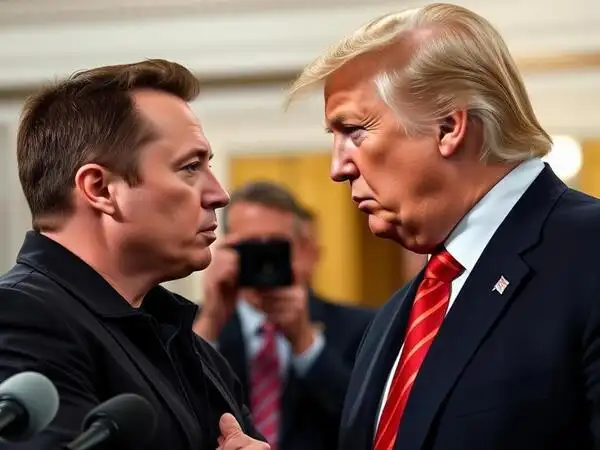In a dramatic escalation of tensions between two of the most prominent figures in American politics and business, Tesla CEO Elon Musk has publicly warned that President Donald Trump’s aggressive tariff policies could plunge the United States into a recession by the second half of 2025. This stark prediction marks a significant shift in Musk’s stance, as he had previously been a vocal supporter of Trump’s economic initiatives.
A Fractured Alliance
The relationship between Musk and Trump has deteriorated rapidly in recent weeks. Once allies in reshaping Washington’s approach to business and innovation, their alliance has unraveled over disagreements on trade policies and fiscal strategies. The immediate catalyst for the fallout was Trump’s announcement of sweeping tariffs, dubbed the “Liberation Day” tariffs, which imposed a 10% levy on all imported goods, with higher rates on specific countries like China and the European Union. Musk criticized these measures, stating unequivocally on social media platform X, “The Trump tariffs will cause a recession in the second half of this year.”
Economic Concerns and Market Reactions
Musk’s warning aligns with concerns from various economic analysts who fear that the tariffs could disrupt global supply chains, increase production costs, and ultimately lead to job losses and decreased consumer spending. JPMorgan initially estimated a 60% chance of a recession following the tariff announcement, though they later adjusted this projection after some tariffs were paused.
The financial markets have already felt the impact. Tesla’s stock experienced a significant decline, dropping 14% and erasing approximately $150 billion in market value. This downturn reflects investor anxiety over potential retaliatory measures from trade partners and the broader implications for the U.S. economy.
Personal Attacks and Political Ramifications
The feud between Musk and Trump has extended beyond policy disagreements into personal attacks. Trump accused Musk of betraying the administration over a tax bill, claiming that Musk’s opposition was rooted in provisions that would scale back electric vehicle tax credits benefiting Tesla. In response, Musk labeled the bill a “disgusting abomination” and denied being informed about its contents.
The conflict intensified when Musk suggested that Trump should be impeached and alluded to alleged ties between Trump and Jeffrey Epstein. Trump retaliated by threatening to terminate government contracts with Musk’s companies, including SpaceX and Starlink, and labelled Musk as “crazy.”
Implications for the U.S. Economy
The escalating dispute raises questions about the stability of the U.S. economy and the potential for a recession. The tariffs have already led to increased costs for businesses and consumers, and further retaliatory measures from trade partners could exacerbate the situation. The Congressional Budget Office has warned that the Republican-backed tax-and-spending-cut bill could raise the national deficit by $2.4 trillion over a decade, adding to economic uncertainties.
Musk’s prediction of a recession underscores the risks associated with protectionist trade policies and highlights the need for careful consideration of their long-term effects on the economy.
Conclusion
The public feud between Elon Musk and President Donald Trump over tariff policies and economic strategies has not only strained their personal relationship but also cast a shadow over the U.S. economy’s outlook. As the debate continues, investors, policymakers, and the public will be closely monitoring developments to assess the potential impact on economic growth and stability.




